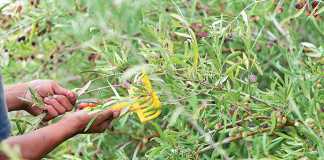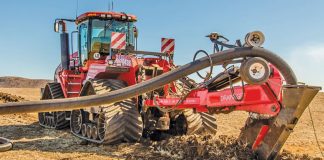Stuart and Grant McMurray are reaping the rewards of essential oil production in Zululand, KZN, after identifying the need for a South African operation that could supply the growing international demand for the organic product. Robyn Joubert chats to Grant about their thriving business.
In 2001 father and son team Stuart and Grant McMurray started producing essential oils the organic way on 30ha of fertile soil between Melmoth and Ulundi, in Zululand, KZN.
“Everything we do, we do organically and there is huge demand for that internationally,” says Grant, who is also involved in marketing oil for members of the KZN Essential Oil Producers’ Association. The McMurrays’ essential oils are used mainly in the fragrance and perfume industries. They export bulk to Europe and they also have a retail brand called SOil that they sell locally and in Dubai. “Marketing is a tricky business, but having an organic product to sell makes it a whole lot easier,” Grant explains. The McMurrays have secured a niche for themselves in SA as their products are the only certified organic essential oils in the country.
Extensive trials
The McMurrays’ first step was to run extensive two-year trials of 20 different plant species. They needed to establish which oil to produce to meet meet international standards for export.
“We established which we could produce profitably, and then scaled up to 0,2ha plots to evaluate the crops on a bigger area. We then selected various crops that were most profitable. That’s what led us to the current crops,” Grant explains.
The quality of essential oils is affected by many factors, including altitude, soil type and climate. “We are fortunate that our fertile soils and moderate climate ensure that the oils we produce are of a high quality.”
The farm is planted to 20ha of indigenous rose-scented geranium (Pelargonium graveolens), 8ha rosemary (Rosmarinus officinalis), 4ha lemon grass (Cymbopogon citrates), and 1ha thyme (Thymus vulgaris) and gully gum (Eucalyptus smithii) respectively. They are running trials with tea tree (Melaleuca alternifolia), lavandin and marjoram.
The McMurrays produce in the region of 0,5 tons of rose geranium oil per season. “It’s a high value, low yield oil. It’s traded by the kilogram but because it’s lighter than water, there are about 1,1 litres oil per kilogram,” Grant says.
The production process
About 15 000 rose geranium stems are planted per hectare, but the number varies from site to site, taking into account factors such as irrigation. The oil is derived from the leaves, so when ready, the entire plant is harvested by a tractor-drawn cutter.
This happens three times a year in dry conditions. “We are not sure why, but if you distill after rain, the yields are way down. We get better yields when it warms up, at about 8am on a sunny day,” he says. The plants are then gathered by hand and loaded into bags and taken to the distillery.
Leaves are distilled in a steam distilling unit, about a ton of plant material at a time. Steam filters upwards through the material, vaporising the oils in the plant. The mixture of steam and oil is then passed through a condenser which cools it, changing it from steam into liquid. The liquid flows into a separator where the oil floats to the surface and is drawn off, leaving only the water, which is known as floral water or hydrosol.
“We use an open system which means that no pressure builds up in the system. This results in a slow and relatively cool extraction. Together with our stainless steel processing system, it ensures the volatile oils retain all their qualities,” Grant explains.
Organic matters
Their soil have been certified organic by German-based agency BCS Oko-Garantie which certifies according to EU and US Department of Agriculture regulations. “For a field to be certified organic, it must have been free from chemical fertilisers and poisons for at least three years. We are fortunate that our fields have been free from chemicals for much longer than that.”
After each harvest, organic fertiliser or compost is applied. If any fungus is encountered, the McMurrays generally cut plants back rather than resorting to organic pesticides. They currently have a problem with a leaf hopper in their geraniums, but are taking a wait and see approach.
They make their own cuttings from the tips of mother stock plants to ensure high quality seedlings. “These are inserted into an organic growing medium. The cuttings are watered by automated mist sprayers and kept in the nursery for about six weeks. Once the cuttings have rooted, they are transplanted into the fields by hand,” Grant explains.
This is a labour-intensive operation, as each hectare requires tens of thousands of plants, while weeding is also done by hand. “However, this labour-intensive type of agriculture is just what is needed in rural Zululand where unemployment persists,” he says.
The McMurrays are riding a wave of success – so much so that they have few concerns about an over-supplied market – and they are mentoring six neighbouring commercial farmers to produce rose-scented geranium organic essential oil.
Karen Swanepoel, coordinator of the Southern African Essential Oil Producers’ Association, agrees that rose geranium is one of the crops with the greatest potential for developing an industry in South Africa. “There are major commercial producers of rose geranium in South Africa, but they cannot supply enough to meet the demand. South Africa is currently importing, when we should be producing enough to export.”
For more information contact
Grant McMurray on 084 622 8811,
e-mail [email protected] or visit www.soil.co.za.













